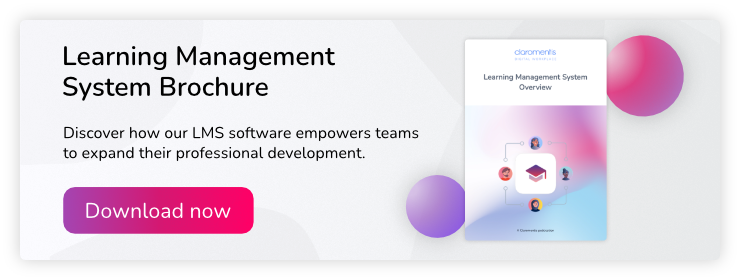As e-learning has grown, more and more companies are seeing the benefits of switching some or all of their corporate training over to an online learning environment. Although e-learning can be expensive initially to implement, it pays off each and every time an employee completes a course.
E-learning in the workplace is not only cheaper than traditional learning but it is also more efficient too, cutting down significantly on the course and instruction time. Here are the top ten reasons to make the change today.
Benefits of e-learning in the workplace
1. Employees will be more productive
One of the most obvious reasons for investing in e-learning is to develop your employees’ learning and development. By doing this, you’ll notice that your employees become more productive, as they have the training they need to perform better than before.
Not only can effective e-learning develop employees’ skills and knowledge so they can perform their role better, but it can also help employees develop better interpersonal and team working skills. This can create harmony and boost efficiency as team members work in collaboration with each other.
2. They’ll remember what they’ve learned
By engaging employees with interactive learning opportunities, e-learning at work can help them better retain the information. When appropriate real-life examples, media and assessment questions are used, these different formats can help employees to relate to what they are learning. This can then make it easier to recall at a later date, and makes the training more enjoyable.
3. Online training courses are easy to update
One of the major benefits of digital learning in the workplace – and one that is easily overlooked – is the ability to update any e-learning course, anytime. This feature means that you can quickly and easily ensure that your employees have the latest training content on different e-learning topics.
For example, if you distribute a new company policy and you want to make sure all employees understand it, you can update the relevant training sessions. Equally, if you need to train employees on a new system or piece of tech, you can provide e-learning training to cover this.
4. Employees can choose when and where to access training
One of the top advantages of e-learning in the workplace is that teams can choose when and where they learn. They can also complete their training over several sessions or all in one go. This means e-learning can be flexible around your employees’ work, allowing them to complete essential training without falling behind on essential tasks. Plus, as the courses are always there, should your employee wish to refresh their training on a particular topic, they can. This means happier and better-informed employees, which leads to a more productive workplace.
5. No more need to hire trainers to deliver courses in-house
Once you have e-learning in the workplace set up, you no longer need to hire external consultants to come in and deliver training to your teams. Other associated costs, such as venue or AV equipment hire, are also no longer needed, which will result in huge savings as well as allowing employees more freedom when accessing learning courses.
6. Employees can go at their own pace
Compared to traditional training, where employees are forced to follow the pace of the trainer and their co-workers, e-learning allows employees to complete courses in their own time depending on their needs or work schedule.
They can also revisit areas they have previously studied in order to refresh their memory. This freedom has been shown to make employees more productive and effective at completing e-learning courses, significantly reducing course durations when compared to a traditional physical trainer session. It also allows employees to absorb information more readily, thus improving retention.
7. Training costs will be significantly reduced
By removing the need for printed handouts, physical trainers, facilities and rooms, and not to mention blocking working time out of all employees’ working days to attend an offline training session, you’ll find that your training becomes more cost effective.
By allowing employees to access e-learning at a time that is convenient for them, and having all of the necessary resources available on your learning platform as well, the cost of each training session is greatly reduced.
Although the initial cost of each e-learning course may be higher than one training session on the same topic, as more employees access and use the training, the cost of each employee completing the training reduces rapidly. By providing a full learning management system, you’ll also find it easier to track when each employee has completed a course.
8. Compulsory training and records of learning
Through dynamic learning records, e-learning can completely reshape the way you deliver and track essential training, such as workplace health and safety courses. Because learning management systems are quick and easy to update, it can take the hassle out of policy updates, as you can easily update a course with the new information in a matter of moments. Thanks to e-learning reporting, you can also see when staff members have completed certain courses and who still needs to complete them. This is especially useful if you have mandatory training that you require all staff to complete, such as inductions, fire safety, and workplace assessments.
9. Information and resources at your fingertips
Because e-learning is always online, employees can easily access the information they need, any time they need it. This can improve working practices as employees can check their understanding and develop their knowledge throughout their normal work whenever they have a spare moment.
10. Happy and engaged employees
By providing a fun and engaging way to improve your employees’ skills and knowledge, you’ll find that they are better and more productive at their work. You’ll also notice that because they have the knowledge to do their work more efficiently, your teams’ confidence and workplace wellbeing will grow.






